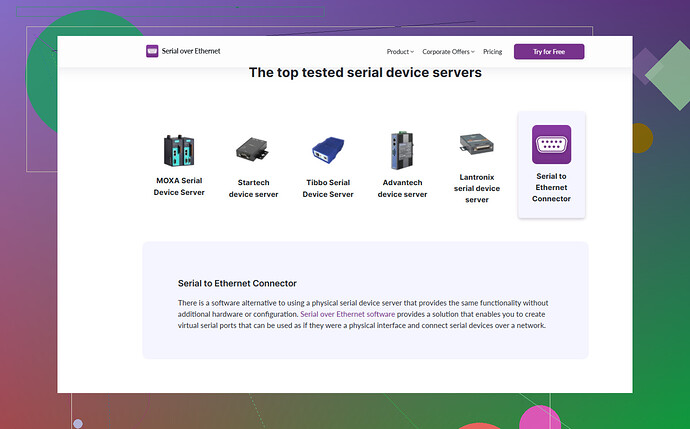I’m looking to choose a serial device server but I’m not sure where to start. I need something reliable and compatible with my system. Can anyone provide recommendations or tips on what to look for? Any help would be appreciated!
You want to pick out a serial device server and don’t know where to start? Let’s dive into it.
First off, determine your needs. Are you connecting multiple devices or just one? Do you need advanced security features? How fast does your data need to move? Answering these can narrow down your options significantly.
A great place to start is by looking at reliability and compatibility, essentials for smooth operations. Some solid options in the market include products from Moxa and Lantronix. Personally, I’d also recommend checking out the Serial to Ethernet Connector. It’s a top pick for many due to its compatibility with various systems and reliable performance.
Factors to consider:
- Port Density: If you need to connect multiple devices, get a server with numerous ports.
- Speed: Make sure the baud rate meets your requirements.
- Power Supply: Double-check if it matches your environment’s power supply.
- Network Protocols: Ensure it supports the protocols you need (TCP/IP, UDP, etc.).
- Ease of Setup: A device with a straightforward installation process can save a lot of headaches.
A personal story here – I once went with a cheaper, lesser-known brand to save some cash. Big mistake. The setup was a nightmare and the device failed within months. Learned my lesson the hard way. Now, I always go for established brands or recommended devices like the Serial to Ethernet Connector.
Lastly, always review product documentation and user reviews! They can provide insights into real-world performance and quirks you might not find in the spec sheet.
For a deeper dive into integrating serial devices into modern networks, you might find this guide useful.
If you’re on the hunt for a serial device server, there are a few more angles worth considering, besides what was mentioned by @himmelsjager. I won’t repeat the tips on reliability and port density, but here are some additional points:
- Scalability: Think about future-proofing your setup. A server that can easily expand with your needs might be crucial.
- Redundancy and Failover: Check if the device offers redundancy or failover options to ensure continuous operation in case of a failure.
- Remote Management: Opt for a server that supports remote configuration and troubleshooting. It can save loads of time if something goes wrong.
- Environmental Ratings: If your device will be in a harsh environment, consider the device’s durability – look for industrial-grade servers.
- Software Support: Sometimes, the software bundled with these devices can make a big difference. Ensure it’s user-friendly and regularly updated.
From practical experience, Moxa and Lantronix are indeed robust choices. However, I’ve had a positive experience with Serial to Ethernet Connector - super easy to use and seamlessly bridges your legacy serial devices with a modern Ethernet network.
Pro Tip: Don’t skimp on the security features. With networked devices, any security gap could be exploited, especially if you’re dealing with sensitive data.
A little story here: I once had to deal with a vendor that overlooked the power supply mismatch. We ended up frying a couple of devices. Painful lesson learnt – triple check every spec detail.
In conclusion, balancing your immediate needs with a bit of foresight for future scalability should help you zero in on the perfect serial device server. User reviews and comprehensive product documentation can often flag issues or confirm reliability before you buy.
For the detailed serial device server software, you can download it directly from this link.
Happy hunting!
For sure, picking a serial device server can be a bit overwhelming with all the options out there. Let’s see if I can add some fresh insights, building on what @stellacadente and @himmelsjager mentioned.
Advanced Jargon Style:
When selecting a serial device server, one often overlooked parameter is latency compensation. This is especially pivotal if you’re dealing with time-sensitive data transmissions. Another crucial element is data encapsulation protocol, which impacts how efficiently your serial data translates over Ethernet.
Pros & Cons for Serial to Ethernet Connector:
Pros:
- Compatibility: It works seamlessly with both Windows and Linux platforms, which ensures a wide range of usability.
- Software Support: Comes with a robust software package that simplifies configuration and management.
- Reliability: Known for consistent performance, even in demanding environments.
Cons:
- Initial Setup: Might require more detailed configuration compared to basic alternatives.
- Flexibility: While highly functional, some users find it less flexible in comparison to modular systems.
Competitors:
Moxa: Provides industrial-grade robust solutions, ideal for extreme conditions.
Lantronix: Great for scalability and offers excellent remote management features.
Final Suggestions:
- Customization: Look for a server that allows detailed customization to fine-tune performance.
- Firmware Updates: Regular updates can enhance security and functionality over time.
- User Community: Joining forums or groups can provide real-time troubleshooting, user experiences, and tips.
All in all, carefully weighing these considerations against your specific requirements will guide you toward the best choice. Good luck with your hunt!
